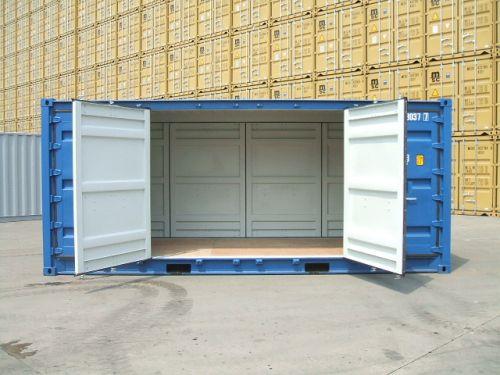Cost Effective Selling and Renting of Containers for Businesses

When considering cost-effective options for your business’s container needs, understanding the nuances of selling versus renting is crucial. The decision between the two can significantly impact your bottom line and operational efficiency. From initial costs to long-term benefits, each approach offers distinct advantages worth exploring. As you navigate through the intricacies of container solutions, a thoughtful evaluation tailored to your specific business requirements will be key in making a well-informed choice.
Benefits of Container Selling
When you choose to sell containers for your business, you open up a world of opportunities for efficiency and cost savings. By selling containers instead of renting them, you have the flexibility to tailor the containers to meet your specific needs. You can customize the size, shape, and features of the containers to optimize storage space and organization within your business operations.
Additionally, selling containers allows you to make a one-time investment that can result in long-term savings. Instead of recurring rental fees, you own the containers outright and can use them for as long as needed without additional costs. This can be particularly beneficial for businesses with stable storage requirements or those looking to streamline their logistics processes.
Selling containers also gives you the freedom to modify and reconfigure them as your business evolves, providing a versatile solution that can adapt to your changing needs over time.
Advantages of Container Renting
Consider the convenience and flexibility that container renting offers your business. Renting containers can be a smart choice for various reasons:
- Cost-Effective: Renting containers eliminates the need for a large upfront investment, allowing you to allocate your financial resources more efficiently. You can benefit from using high-quality containers without the significant capital outlay required for purchasing.
- Scalability: Renting containers provides the flexibility to scale your storage or shipping needs according to your business requirements. You can easily adjust the number and size of rented containers based on seasonal demands or fluctuations in your operations.
- Maintenance and Upkeep: When you rent containers, maintenance and repairs are typically handled by the rental company, saving you time and resources. This ensures that your containers are always in optimal condition, reducing the risk of unexpected expenses related to maintenance.
Cost Comparison: Selling Vs. Renting
To determine the most financially advantageous option for your business, comparing the costs of selling versus renting containers is crucial. When you sell containers, you may receive a lump sum upfront, but you lose the potential for recurring revenue. On the other hand, renting containers allows for a steady stream of income over time, providing more predictable cash flow.
Selling containers involves initial sales costs, such as marketing and transportation, which can eat into your profits. Renting, however, may require maintenance expenses, but these can often be passed on to the renters.
Additionally, when you sell containers, you also lose the ability to adapt to changing needs or expand your fleet easily. Renting offers flexibility, allowing you to adjust the number of containers based on demand.
Consider the long-term implications for your business when deciding between selling and renting containers. Evaluate your financial goals, growth plans, and operational needs to make an informed decision that aligns with your overall strategy.
Choosing the Right Container Supplier
For businesses looking to acquire containers, selecting the right supplier is a critical decision that can impact operational efficiency and overall costs. When choosing a container supplier, consider the following:
- Quality of Containers: Ensure that the supplier offers durable and high-quality containers that meet your business needs. Inspect the materials used and the construction of the containers to guarantee longevity and reliability.
- Cost-Effectiveness: Compare prices among different suppliers to find the most cost-effective option without compromising on quality. Look for suppliers that offer competitive pricing, discounts for bulk purchases, or rental options that fit your budget.
- Customer Service and Support: Evaluate the supplier’s customer service and support policies. Opt for a supplier that provides excellent customer service, easy communication channels, and prompt assistance in case of issues or maintenance needs. A reliable supplier will help ensure a smooth and efficient container acquisition process for your business.
Tips for Maximizing Container Efficiency
To enhance your business operations and optimize resource utilization, implementing strategies to maximize container efficiency is crucial. Start by organizing your inventory based on the frequency of access. Place high-dem Selling containers Across Russia items in easily accessible containers to reduce retrieval time. Utilize stackable containers to make the most of vertical storage space and improve warehouse organization. Implement a labeling system to quickly identify the contents of each container, aiding in inventory management and retrieval processes.
Regularly inspect containers for damages and promptly repair or replace them to prevent any disruptions in your operations. Consider investing in specialized containers, such as those with wheels or dividers, to customize storage solutions according to your specific needs. Train your staff on proper handling and stacking techniques to prevent accidents and optimize space utilization. By implementing these tips, you can streamline your operations, increase productivity, and ultimately maximize the efficiency of your container usage.
Conclusion
In conclusion, when considering the cost-effective options of selling and renting containers for your business, weigh the benefits and drawbacks of each approach. Whether you choose to sell or rent containers, make sure to evaluate your budget, long-term requirements, and potential for recurring revenue. By doing so, you can make an informed decision that aligns with your business goals and storage needs.



